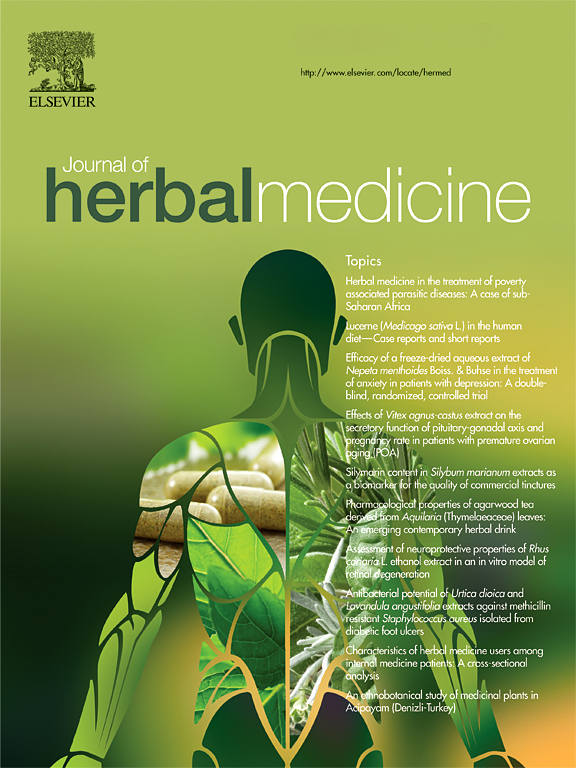比较荨麻和安慰剂对绝经后妇女阴道细胞学和 pH 值的影响:随机对照试验
IF 1.9
4区 医学
Q2 INTEGRATIVE & COMPLEMENTARY MEDICINE
引用次数: 0
摘要
引言 绝经期雌激素减少会导致阴道内膜变薄、阴道酸度上升和阴道成熟度下降。2021-2022 年,一项三盲随机安慰剂对照临床试验在戈勒斯坦地区的 84 名 45-60 岁绝经后妇女中展开,这些妇女符合资格标准,并在综合保健中心就诊。符合条件的女性在 8 周内服用了含 5%荨麻提取物的阴道乳膏和安慰剂。数据分析采用 SPSS 软件进行。结果干预前,两组女性阴道 pH 值和阴道成熟度的平均值(标清)无显著差异。干预后第四周和第八周,荨麻组阴道 pH 值的平均值(标清)分别为 4.8 ± 0.7 和 4.3 ± 1.0,VMV 值的平均值(标清)分别为 50.8 ± 8.8 和 51.3 ± 8.9。结论使用荨麻阴道霜八周后,绝经后妇女的阴道成熟度值升高,阴道 pH 值降低。本文章由计算机程序翻译,如有差异,请以英文原文为准。
Comparing Urtica dioica to placebo on vaginal cytology and pH in postmenopausal women: A randomized, controlled trial
Introduction
Decreased estrogen in the period of menopause causes thinning of the vaginal lining, a rise in vaginal acidity, and a drop in vaginal maturation levels. Menopausal women are seeking treatment for bothersome vaginal symptoms, opting for herbal treatments instead of hormone therapy due to their side effects or contraindications.
Methods
In 2021–2022, a triple-blind randomized placebo-controlled clinical trial was carried out on 84 postmenopausal women aged 45–60 from Golestan who had the eligibility criteria and sought services from comprehensive health centers. The qualified females were given 5% vaginal cream containing Urtica dioica extract and a placebo for a duration of 8 weeks. Analysis of data was performed with SPSS. Vaginal PH and maturation value were measured before, as well as four and eight weeks following the intervention.
Results
Before the intervention, there was no significant difference in the mean (SD) scores of the vaginal pH and VMV between the two groups. During the fourth and eighth weeks post-intervention in the Urtica dioica group, the mean (SD) vaginal pH scores were 4.8 ± 0.7 and 4.3 ± 1.0, and also the mean (SD) VMV scores were 50.8 ± 8.8 and 51.3 ± 8.9, respectively. There was a significant difference between the intervention group and the placebo group (P<0.001).
Conclusions
After using Urtica dioica vaginal cream for eight weeks, postmenopausal women displayed higher vaginal maturation value and lower vaginal pH.
求助全文
通过发布文献求助,成功后即可免费获取论文全文。
去求助
来源期刊

Journal of Herbal Medicine
INTEGRATIVE & COMPLEMENTARY MEDICINE-
CiteScore
3.90
自引率
0.00%
发文量
94
期刊介绍:
The Journal of Herbal Medicine, the official journal of the National Institute of Medical Herbalists, is a peer reviewed journal which aims to serve its readers as an authoritative resource on the profession and practice of herbal medicine. The content areas of the journal reflect the interests of Medical Herbalists and other health professionals interested in the clinical and professional application of botanical medicines. The objective is to strengthen the research and educational base of herbal medicine with research papers in the form of case studies, original research articles and reviews, monographs, clinical trials and relevant in vitro studies. It also publishes policy statements, opinion pieces, book reviews, conference proceedings and profession related information such as pharmacovigilance reports providing an information source for not only the Herbal Practitioner but any Health professional with an interest in phytotherapy.
 求助内容:
求助内容: 应助结果提醒方式:
应助结果提醒方式:


